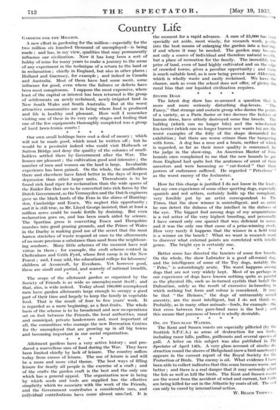Our own small holdings have cost a deal of money
; which will not be made good, which must be written off ; but he would be a pessimist indeed who could visit Holbeach or Sutton Bridge and deny the quality of the colonies of small- holders settled there by Government after the War. The houses are pleasant ; the cultivation good and intensive ; the number of men and women on the land is large. Invaluable experience has been gained. On the whole, the smallholders there and elsewhere have fared better in the days of deepest depression than other larger units. Thereabouts is to be found rich land riper for reclamation than the wide spaces of the Zuider Zee that are to be converted into rich farms by the Dutch Government, as the Vermuyden and the Dutch engineers gave us the black lands of the Fens in the shires of Hunting- don, Cambridge and Essex. We neglect this opportunity ; and it is still true, as Mr. Lloyd George insisted, that at least a million acres could be made fertile by draining. But even reclamation goes on, and has been much aided by science. The Spartina grass is converting Essex and Hampshire marshes into good grazing grounds, and the Prince of Wales in the Duchy is making good use of the secret that the most barren stretches of waste respond at once to the allurements of no more precious a substance than sand from the neighbour- ing seashore. Many little schemes of the moment have real virtue in them ; for example, the croft scheme centred in Cheltenham and Grith Fyrd, whose first camp is in the New Forest ; and, I may add, the educational college for labourers' children at Avoncroft, by Evesham. Yet however good, these are small and partial, and scarcely of national breadth.














































 Previous page
Previous page